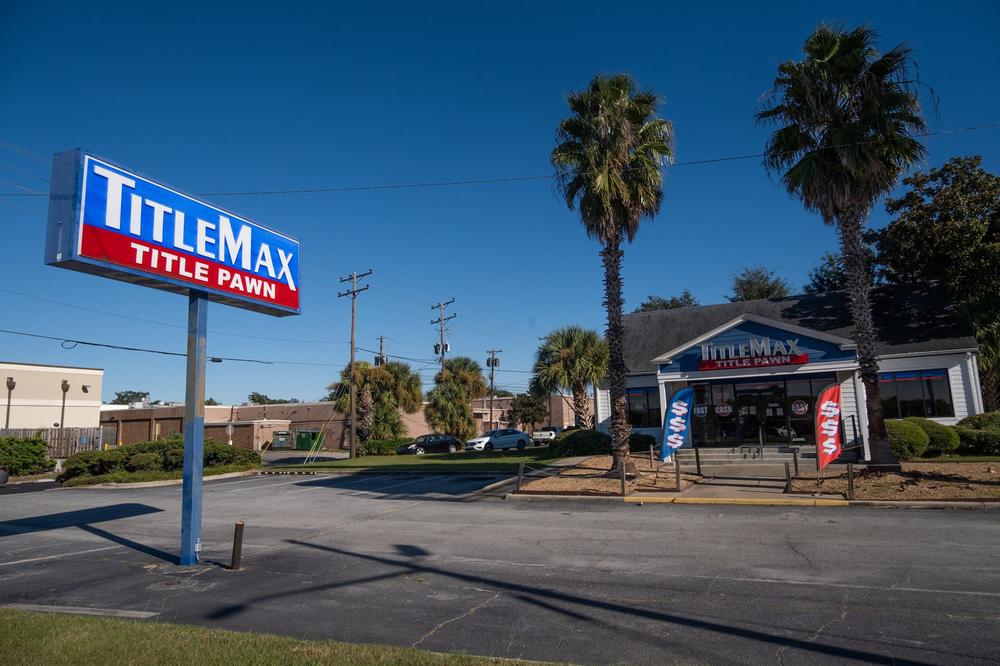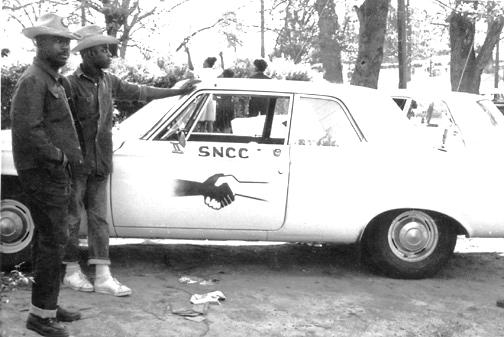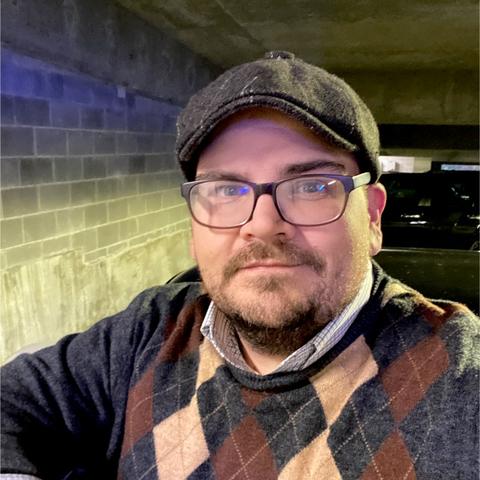
Section Branding
Header Content
Georgia Today: Shipwreck found; banning leaf blowers; huge fine for TitleMax
Primary Content
On the Monday Feb. 27 edition of Georgia Today: Lost cargo ship from Savannah may have been found, lawmakers are debating what kind of leaf blower you can own, and a huge fine for TitleMax

Peter Biello: Welcome to the Georgia Today podcast from GPB News. Today is Monday, Feb. 27. I'm Peter Biello. On today's episode, a long-lost cargo ship from Savannah may have been found. State lawmakers are debating what kind of leaf blower you can own. And Savannah-based lender TitleMax gets a huge fine. These stories and more are coming up on this edition of Georgia Today.
Story 1
Peter Biello: The National Park Service says a long lost cargo ship from Savannah may have been found off the coast of Long Island. GPB's Benjamin Payne reports.
Benjamin Payne: The SS Savannah was a first-of-its-kind steamship that ran aground in 1821, enroute from Savannah to New York. The crew survived, but the ship vanished. More than 200 years later, officials say debris that washed ashore last October after Tropical Storm Ian is consistent with the ship's characteristics. The wreckage was found near Fire Island National Seashore, a barrier island south of Long Island. The National Park Service says it's working with experts to try to figure out if it's a match and put it on public display. The SS Savannah was the first cargo ship to partially use a steam engine to sail across the Atlantic Ocean. For GPB News, I'm Benjamin Payne in Savannah.
Story 2
Peter Biello: About 45 students from 10 Georgia colleges and universities are planning to leave for Washington, D.C., tonight ahead of tomorrow's Supreme Court hearing on student loan debt cancellation. The high court is about to hear arguments over President Joe Biden's plan to relieve student loan debt for millions of Americans. Albany State University graduate Maggie Bell is helping to organize the Georgia students. She says that student loan debt is, quote, "pushing back her future."
Maggie Bell: I'm in a phase where, like. I keep ticking at my savings. It's not affordable to live in these conditions.
Peter Biello: The White House says 642,000 Georgians have been approved for student loan forgiveness out of 26 million people nationwide.

Story 3
Peter Biello: A federal consumer watchdog group has fined TitleMax $15 million for predatory lending practices. The Consumer Financial Protection Bureau said last week the Savannah-based title lender intentionally evaded laws meant to protect military families from predatory lenders. They say it also charged illegal insurance fees to more than 17,000 customers.
Story 4
Peter Biello: State senators want to prevent state and local governments from passing ordinances to ban gas-powered leaf blowers. The Senate approved the bill 37 to 16 over objections from senators who noted concerns about the noise pollution and carbon emissions that such machines produced. The bill's sponsor, Norcross Republican Shawn Still, also addressed another objection.
Shawn Still: To my colleagues concerned about whether or not this bill preempts local control, I offer that this bill exactly gives local control to each individual homeowner to decide what they're going to do in their own yard.
Peter Biello: Still said electric leaf blower still have a ways to go before they match the performance of gas-powered ones. He and the Senate agreed, however, to sunset the law in 2031 to give the technology time to catch up.

Story 5
Peter Biello: The National Weather Service has confirmed a rare and damaging storm pattern during the January 12th tornadoes southwest of Atlanta. Agency meteorologist Kyle Thiem says as many as four tornadoes were circulating around a larger circulation as they approached hard-hit Griffin.
Kyle Thiem: The added spin of the storms intensified the tornadic circulations at that point in time, and we found a correlation with more extreme damage that was documented whenever these tornadic circulations merge together.
Peter Biello: This dance of tornadoes is more commonly seen in the Midwest's Tornado Alley.
Story 6
Peter Biello: Northeast Georgia Medical Center-Gainesville says it is now verified as a Level 1 trauma center. That makes it the fifth hospital in the state and the second in North Georgia to have that designation after Atlanta Medical Center closed last fall. Grady Memorial Hospital became the only Level 1 trauma center in the region. Level 1 trauma centers must be able to provide comprehensive trauma care for all injuries. That's according to the American College of Surgeons.
Story 7
Peter Biello: Gray Television says it plans to complete construction on a massive film and TV studio northeast of Atlanta by June. The Atlanta-based company also told investors Friday that it plans to pause development of an adjacent 80-acre housing, retail, restaurant and hotel complex, citing, quote, "macroeconomic concerns." The projects are on the former site of a General Motors plant that Gray is redeveloping in Doraville.

Story 8
Peter Biello: Sixty-three years ago, four Black college students in Greensboro, N.C., stayed in their seats at a segregated Woolworth's lunch counter after the staff refused to serve them. Some 300 students would soon join that protest with sit-ins across the South, including in Georgia, seeking to harness the momentum of the sit-in movements. Students gathered at Shaw University in Raleigh, N.C., to strategize, and in April 1960, the Student Nonviolent Coordinating Committee, also known as SNCC, was founded. To travel throughout the rural South, they organized a car fleet, kind of like an Uber before Uber. It was called the Sojourner Motor Fleet, named after formerly enslaved woman and abolitionist Sojourner Truth. And the fleet was organized right out of SNCC's headquarters in Atlanta. GPB's Leah Fleming spoke with two Snick members, Judy Richardson and Freddie Greene Biddle.
Leah Fleming: Great, so let’s start at the beginning. You’re all college students at the time with SNCC. How did you afford the cars?
Judy Richardson: It was wonderful because, you know, we had this outreach, you know, with friends of SNCC and — all over the country. Through all of that network SNCC developed in order to support the voter registration work that we were doing, one of those contacts was unions, you know? And so the UAW local — there was a local out of Detroit that was predominantly Black, and they arranged for us to get a fleet of cars — about 23 cars — at low cost.
Leah Fleming: So Freddie, this fleet was organized out of SNCC’s headquarters in Atlanta by administrative secretary Ruby Doris Smith. How did she monitor these cars?
Freddie Greene Biddle: So basically, Ruby, being an organizational person, she was very key in terms of the fact that, one, is cars would be assigned to people. The organization would carry insurance on the cars, which meant that you had to have the proper license, you know? You had to be able to drive and have a license.
Leah Fleming: So Freddie, how were these cars maintained?
Freddie Greene Biddle: We had a garage with mechanics — with like four different mechanics that could really repair the cars. So basically, whenever people were in Atlanta, they had to take the cars back to Sojourner Truth Garage so that they could check them out and make sure that, you know, keeping the oil in so that you wouldn't have a car throwing a rod — you know, unnecessary damage. And Ruby was very straightforward with that — is that, one is that the cars belong to SNCC. But you were assigned the driver and you were responsible for taking care of this car. If you did not do it, the consequences was a car could be taken away from you. You know, definitely, your little $10 check could be stopped. So all of this was really forcing you to be responsible.
Leah Fleming: Do either of you ladies have any memories of riding in the fleet?
Judy Richardson: One of the things I remember using the the fleet: I remember being on the highway going up from Greenwood, Miss., to Atlantic City for the Democratic National Convention in 1964. And honey, people were getting out of our way. White people, on the highway, getting out of our way 'cause our cars look like police cars. They look like state troopers. You know, these Plymouths were wonderful.
Leah Fleming: I heard you couldn't even put logos on the cars, though. So these were unmarked cars.
Judy Richardson: We definitely did not want the logos, because what you were trying to do is not show the sheriff and deputy sheriff and all those white vigilantes who want you dead — and that would also include the local FBI people, but — you know, so the officials at every level really don't want you trying to increase Black voter registration, because they don't want you to have a say in your government. So the bottom line was we had to do this and, you know, try and outrun — outdrive the cops who were chasing us. Oftentimes, we would go onto Black-owned land.
Leah Fleming: Freddie Greene Biddle, you actually were pushed into joining SNCC by a bullet that was actually shot into your family's Mississippi living room.
Freddie Greene Biddle: Well, first I grew up in — I was born and raised in Greenwood, Miss. In 1962, SNCC moved into the Delta area. Now SNCC had, at that particular time, been for about a year and a half down in Southwest Mississippi. But then they moved up into the Delta area, into my hometown. So my brother George and I then wanted to go by the SNCC office to see what was going on and see how we could participate. My brother George, one night coming back from a SNCC meeting came home. Unknowing to him, a guy was really following him, then shotgun blasted through our front door and through the first — the front bedroom. So my father said that basically he said that he was shooting at one member of the family, but now he has shot [at] the whole family involved in SNCC.
Leah Fleming: Mmm. So I know for you, Ms. Richardson, you were an early participant with with SNCC in the 1960s. How did you come to be involved in it?
Judy Richardson: I'd, you know, go in there not because of any great, you know, commitment. It's just because I want to see what I can get into. You know, my mother is not there to stop me. So I go to this meeting and it turns out that, you know, I end up going down to — on the bus — the two hours between Swarthmore College in Pennsylvania, down to the eastern shore of Maryland to Cambridge. And then I start getting arrested, you know, and I'm not in class on Monday. And so at a certain point, Penny Patch, a white student who had been working in the SNCC project in Southwest Georgia, she comes back and she says, "Look, you know, why don't you just take off the next semester?" That would be the first semester of my sophomore year. And she said, and, you know, "Just go work for SNCC in Cambridge." And she said, "But if you want to do that, you got to go by Ruby Doris." And Ruby Doris was the fierce manager, the administrator of the national office of SNCC in Atlanta.
Freddie Greene Biddle: Since you're in Georgia, we should really point out that Ruby Doris is a product of Georgia. She actually was born and raised in Atlanta, had gone to Spelman, got involved with the Atlanta Student Union.
Judy Richardson: The other part about Ruby is that she had the utmost respect of the field staff. And that's what was amazing. And this was female and male.
Leah Fleming: So what would you want young people today to know about SNCC's legacy, especially with these cars, A lot of people don't even know that there was a fleet, the Sojourner fleet.
Freddie Greene Biddle: We had to have resources. And one of the biggest resources was these cars, and these cars helped our SNCC field secretaries be able to go from one place to another place. And our garage helped keep them in order. So it's basically you are developing your own tools so that you are not dependent upon somebody else.
Leah Fleming: All right. I've been speaking with Judy Richardson and Freddie Greene Biddle. A special thank you to our senior producer, Natalie Mendenhall, and our engineer, Victoria Evans-Cash — also very strong women. And a special thanks also to Duke University Libraries and the SNCC Legacy Project as well.
Story 9
Peter Biello: In sports, in the NBA the Atlanta Hawks said yesterday that they've hired Quin Snyder to replace Nate McMillan as coach. The Hawks fired McMillan last week. Snyder was coach of the Utah Jazz, leading the team to the playoffs in six of eight seasons there. In Major League Soccer. Atlanta United beat the San Jose Earthquakes 2-1 Saturday in a season opener. And in spring training baseball, the Braves had what we can call an interesting start to the preseason. Cal Conley of the Braves thought he had just won the game against the Red Sox on Saturday with a two-out, full-count, bases-loaded walk-off walk. But then the new rules around baseball's pitch clock came into play. The pitch clock is one of the new rules designed to speed up the pace of play. Between pitches, pitchers have 15 seconds with nobody on and 20 seconds if there is a base runner. The pitcher must start his delivery before the clock expires. And according to umpire John Lipka, Conley wasn't set in the batter's box, and alert to the pitcher as the clock wound under 8 seconds — and that counts as a third strike. And that ended the game in a tie, which is not something baseball fans often see. There was actually a winner in yesterday's game between the Braves and Yankees, but the Braves fans left disappointed as the Yankees shut them out: 7-zip.
Peter Biello: And that is it for this edition of Georgia Today. Thanks so much for starting your week with us. We've got a whole week's worth of news ahead of us, and to stay on top of it, the best thing to do, of course, is to subscribe to this podcast. Do it now. We'll be with you again in your podcast feed tomorrow afternoon. If you've got feedback, we'd love to hear it. Send it to us by email. The address is GeorgiaToday@GPB.org. I'm Peter Biello. Thanks again for listening. We'll see you tomorrow.
——
GPB's Georgia Today newsletter hits your inbox on Tuesdays, Wednesdays and Thursdays with top stories from around the state featuring news, politics and more. Subscribe here.






